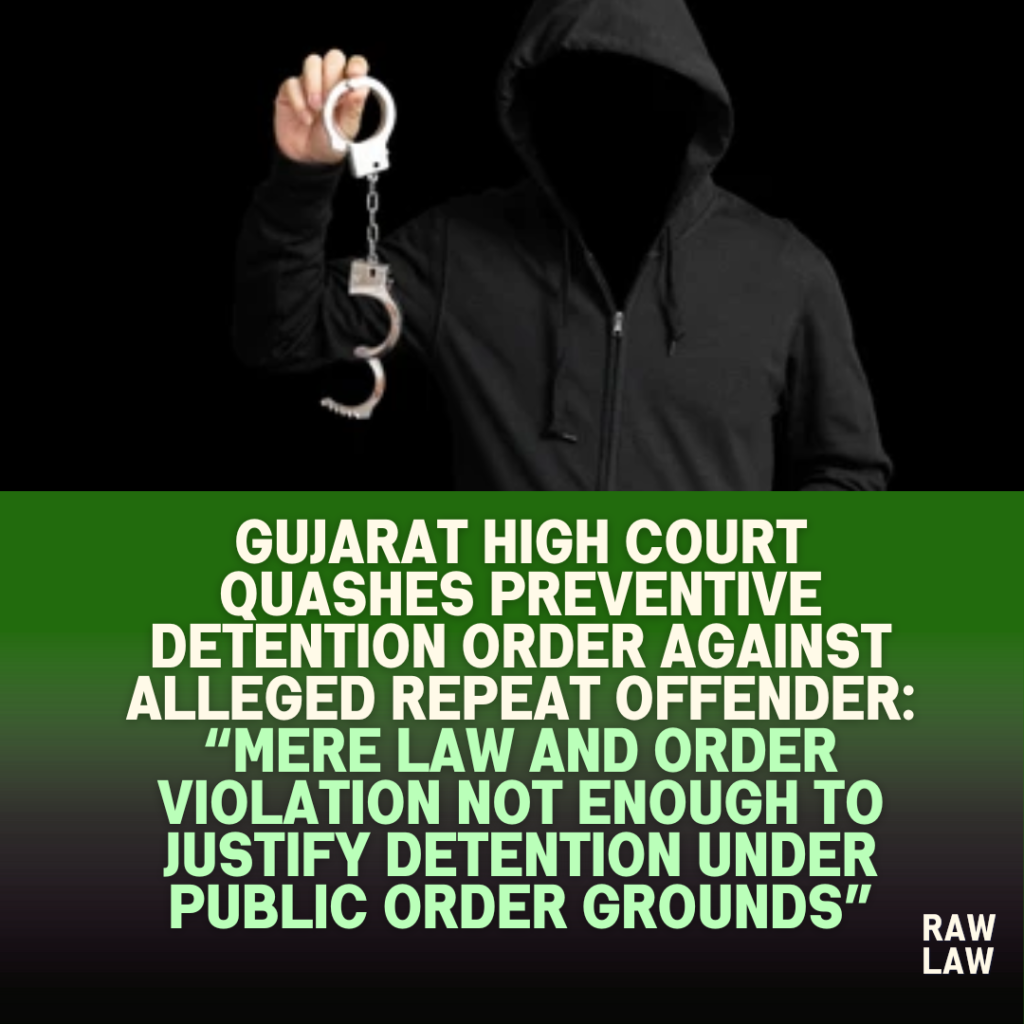Court’s Decision
The Gujarat High Court quashed a preventive detention order passed against the petitioner under the Gujarat Prevention of Anti-Social Activities Act, 1985, holding that the grounds for detention lacked sufficient connection with the concept of public order. The Court directed that the detenue be released forthwith, observing:
“The material on record is not sufficient for holding that the alleged activities of the detenue have either affected adversely or likely to affect adversely the maintenance of public order.”
Facts
The petitioner was detained by the Police Commissioner, Vadodara City, under an order dated 14.05.2025 as a “dangerous person” under Section 2(c) of the Gujarat Prevention of Anti-Social Activities Act, 1985. The grounds of detention cited three criminal cases registered against him under various sections of the Indian Penal Code, the Bharatiya Nyaya Sanhita, and the Gujarat Police Act. The petitioner challenged the legality and validity of this preventive detention order before the High Court.
Issues
- Whether the preventive detention order passed under the Gujarat Prevention of Anti-Social Activities Act, 1985 was legally sustainable?
- Whether the petitioner’s activities could be said to affect the maintenance of public order rather than just law and order?
Petitioner’s Arguments
The petitioner contended that the registration of criminal offences against him was a matter of law and order, not public order. He argued that the detention order lacked nexus to public disorder and failed to satisfy the statutory requirements under Section 3(4) of the 1985 Act. It was asserted that the alleged acts were isolated incidents that did not disrupt the even tempo of life in the community or instill fear or panic among the public.
Respondent’s Arguments
The State argued that the petitioner was a habitual offender whose repeated acts posed a threat to society at large. Given his antecedents and the cumulative effect of his alleged activities, the detaining authority rightly considered his detention necessary to prevent further acts prejudicial to public order in Vadodara.
Analysis of the Law
The Court examined the distinction between law and order and public order, emphasizing that not every legal infraction or isolated violent act qualifies as a disturbance of public order warranting preventive detention. It noted that the Act of 1985 requires a high threshold for detention — the person’s activities must have an adverse effect on the community or instill fear/panic among the public.
Precedent Analysis
The Court relied heavily on the Supreme Court’s decisions:
- Pushkar Mukherjee v. State of West Bengal, (1969) 1 SCC 10: Clarified that disturbances affecting only individuals, rather than the public at large, do not amount to disruption of public order.
- Piyush Kantilal Mehta v. Commissioner of Police, 1989 Supp (1) SCC 322: Held that mere registration of offences, including prohibition-related ones, does not justify detention unless the acts affect the even tempo of life of the community.
These precedents reinforced that habitual lawbreaking alone cannot justify preventive detention unless there’s a direct and tangible impact on public order.
Court’s Reasoning
The Court found that while the petitioner had been booked in three criminal cases, he had already been granted bail in all of them. It concluded that none of the alleged acts had any bearing on public order. The detaining authority’s subjective satisfaction lacked legal basis since there was no evidence of public panic, fear, or disruption to community life resulting from the petitioner’s conduct. The Court held:
“These offences or the allegations cannot be said to have created any feeling of insecurity or panic or terror among the members of the public… The order of detention cannot, therefore, be upheld.”
Conclusion
The Court quashed the detention order dated 14.05.2025 as being legally unsustainable and directed that the detenue be released forthwith unless required in any other case.
Implications
This judgment reinforces the constitutional safeguards against misuse of preventive detention laws. It underscores the need for a clear distinction between criminal acts affecting law and order and those disturbing public order. Detaining authorities must justify preventive detention with objective material demonstrating community-level impact.
Cases Referred
- Pushkar Mukherjee v. State of West Bengal, (1969) 1 SCC 10 – Differentiated public order from mere law and order issues.
- Piyush Kantilal Mehta v. Commissioner of Police, 1989 Supp (1) SCC 322 – Held that habitual offenders cannot be preventively detained unless their acts disrupt public order.
FAQs
Q1. What is the difference between ‘law and order’ and ‘public order’ in preventive detention?
Law and order pertains to localised disturbances or individual acts, while public order involves community-wide disruptions causing fear or panic.
Q2. Can registration of multiple FIRs alone justify preventive detention?
No. The Gujarat High Court held that FIRs alone, without evidence of adverse impact on public order, are insufficient for preventive detention.
Q3. What are the safeguards against preventive detention under the Gujarat Prevention of Anti-Social Activities Act?
The Act requires that the detainee’s actions must adversely affect public order. Courts examine whether such actions disturb the even tempo of life in society.



